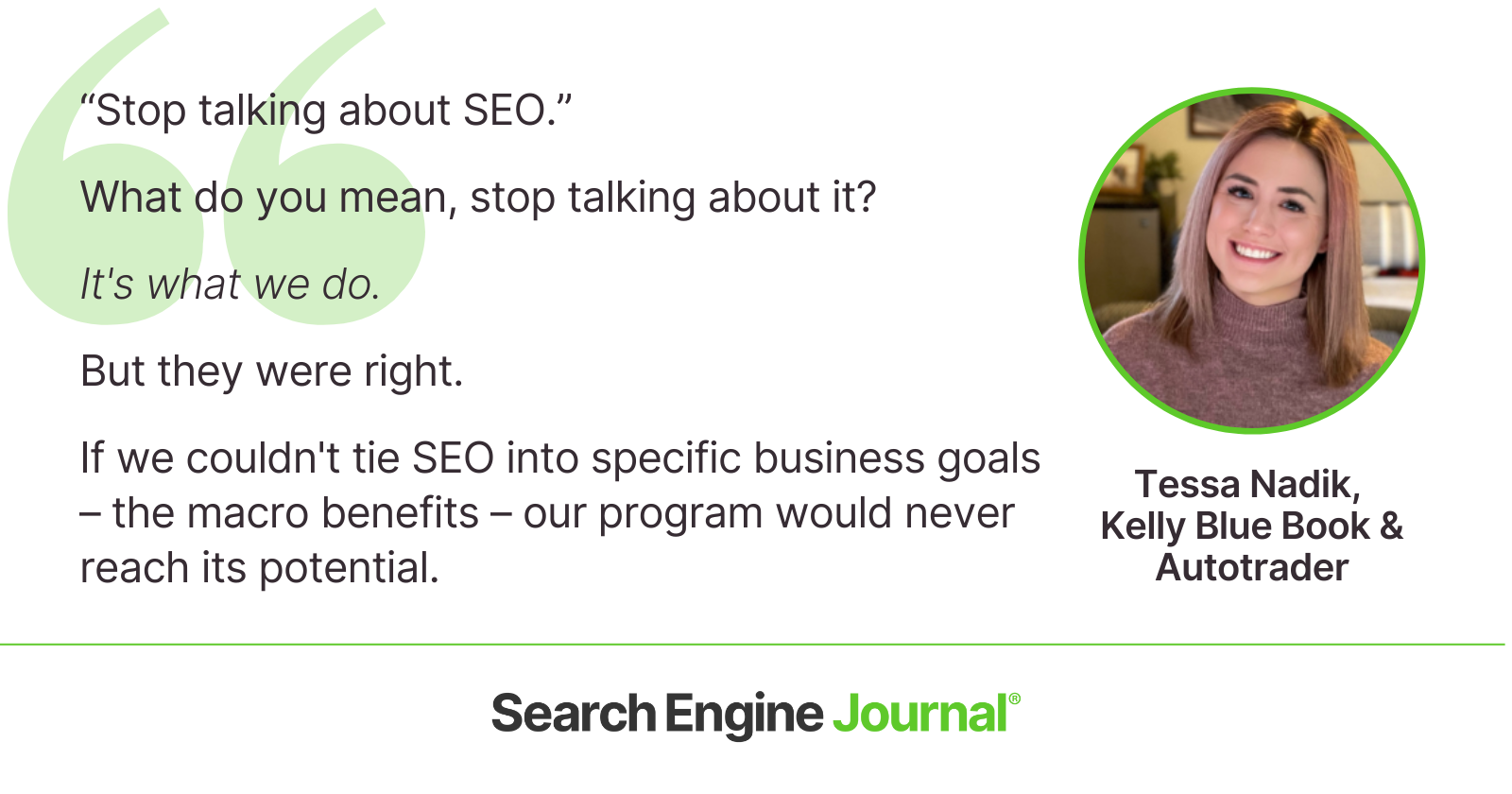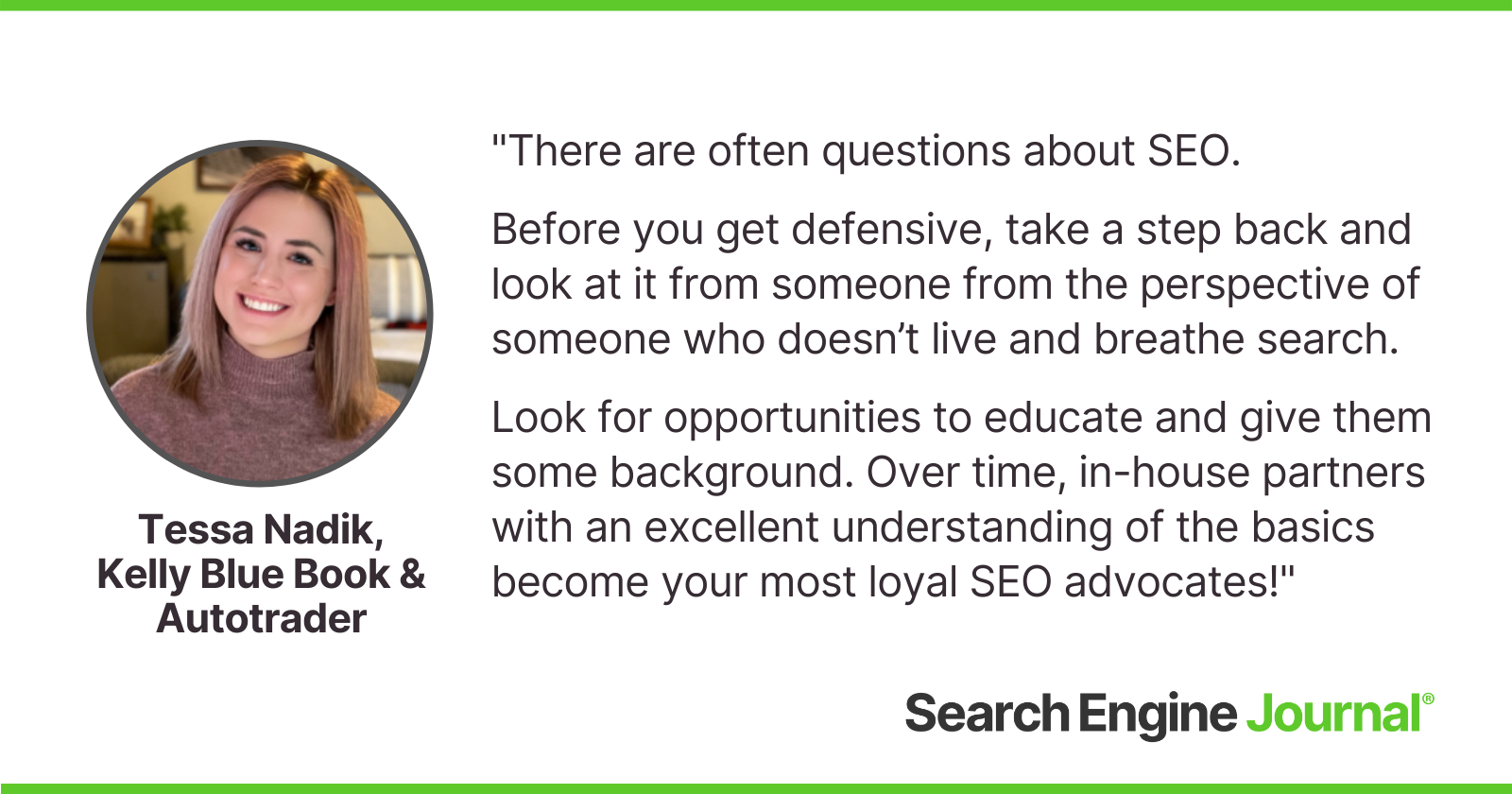Have you ever felt like your team has a million great ideas, but is held back by the challenges in getting the buy-in required to just get things done?
It’s a common hurdle in enterprise SEO, where the sheer scale of initiatives and approvals required can threaten the success of even the best ideas.
In this column, you’ll find tips that will help you bridge the gap between SEO and the rest of the business to drive growth strategy based on my own experiences of having to overcome in-house objections.
Earlier in my career, I was plagued by this feeling that SEO was undervalued; that we had so much potential but lacked enough buy-in to get traction.
There were always older SEO ideologies in play that simplified what SEO was all about.
When I took my first SEO leader position, I still had that same outlook.
Despite our success, I couldn’t figure out why we couldn’t get the support we needed.
That all changed with this one piece of advice that I continue to live by as a leader: “Stop talking about SEO.”
Believe me, when I first heard that I was taken aback.
What do you mean, stop talking about it? It’s what we do.
But they were right. If we couldn’t tie SEO into specific business goals – the macro benefits – our program would never reach its potential.
They were right, and it changed my outlook on how I led and represented the SEO team.
With that change in mindset, my SEO career also progressed way faster than I had ever imagined.

Here are 7 ways our team lives by that mantra and now achieves far more substantial growth in our organic search program as a result.
1. Improve Your Understanding Of The Business
It’s easy to keep your head down and stay hyper-focused on what you are working on – what impacts you directly.
But without a proper understanding of how your company operates, creates, and monetizes, you will never reach your full growth potential.
Continuously improve your understanding of what you know about the company, and as it changes, change with it.
This can be scary if you switch industries.
As an example, going from a traditional ecommerce to a lead generation or ad subscription business requires a shift in mindset and an appetite for learning the ins and outs of what that actually means.
I started out in the steel industry and am now in automotive, and there is a very real learning curve in switching verticals like that.
Don’t be afraid to set up some time with business partners to go over their areas and how they contribute to the business, and how success is measured.
2. Learn More About What The Business Finds Important
Once you understand the business, it is essential to understand what executive leadership and cross-functional teams find imperative.
That means understanding the overarching business OKRs down to the team-level KPIs. Understanding these begin to prepare you for how you will achieve success.
KPIs can vary and may not be traditional ones you are accustomed to, such as visits and revenue.
If you are leading a content-based organization, you may find that you need to implement metrics that show the true value of your product, such as market share, scroll depth, video plays, or lifetime value.
3. Simplify. Simplify. Simplify Again.
You can have the most fantastic idea ever, but good luck if you show up to a meeting with senior leadership with a 30-slide deck about all the SEO tactics you want to use.
Put the information into a cohesive story that answers who, what, why, and how – the most important being the why.
Why would we do this?
All of the great information you gathered about how you’ll execute can live happily in the index and if a question arises, you still have everything you need.
The more you interact with your leadership, the clearer their expectations and which material resonates with them will become.
Never be afraid to reach out and solicit feedback to help inform your next pitch or presentation.
4. Don’t Be Afraid Of Projections
It will always be challenging to get buy-in for SEO work if you never show projections.
As SEO experts, we’re often hesitant to make projections.
But you know what? We shouldn’t be.
No one in your organization knows SEO better than your team. So if anyone is to make the projections, it should be you!
SEO is not a mysterious black box that we don’t understand.
While there are factors and SERP features out of our control, we have so many tools, data, and other resources that putting rough projections together shouldn’t be difficult.
You don’t have to reinvent the wheel, as there are many SEO articles about forecasting.
This gets you the C-suite buy-in and also gives your partners in Marketing, Product, Engineering, etc., a valid argument to pick your work up in a world of forever-competing priorities.
5. Don’t Get Defensive
There are often questions about SEO, especially when it adds complexity to or delays other types of work.
Before you get defensive, take a step back and look at it from someone from the perspective of someone who doesn’t live and breathe search.
Take the time to build relationships with your partners and look for opportunities to educate and give them some background.
It may seem time-intensive but over time, in-house partners with an excellent understanding of the basics become your most loyal SEO advocates!

This is no different from joining a new company, learning their business plans, and becoming an advocate for those plans.
We have seen much success with this strategy, and that can start by establishing some best practices documentation starting with the basics and continuing to add to this library. These can also be great to have when new team members join.
Our partners know to reach out to us with any questions and have an open dialogue around SEO and where we can compromise or achieve precisely what we would like.
6. Know How And When To Prioritize
Not every SEO initiative is equal, and your work isn’t always the highest business priority in each sprint.
As an SEO leader, you need to recognize when to die by something and when it’s smarter to compromise.
We are all working toward the same result and by refusing to prioritize and compromise, your relationships and trust begin to deteriorate.
Whomever you work with, share a prioritized list with KPIs so you can quickly help prioritize that against other work.
7. Socialize And Share Success
No enterprise SEO team is an island.
Louder again for those in the back: no SEO team is successful alone.
SEO at the enterprise level becomes increasingly complex with factors like content, Core Web Vitals, user experience, brand reputation, conversion, lead quality, information architecture, and more all in play.
We can’t specialize in it all.
Our company has an amazing Product, Engineering, UX, and Analytics team equally responsible for driving success.
We are one team working together and specializing in our respective areas, which creates compounding success and gives everyone a sense of pride in what we have built for our consumers.
This is a great model for any product-led organization.
Final Thoughts
Enterprise buy-in does not happen overnight. But by beginning to take initial steps toward the outlined above, you are well on your way!
Stay focused and don’t get discouraged, as longevity is critical to the viability of your organic program.
Understanding your business should be the first step and can help inform the next steps for buy-in.
These tips are great whether you are an individual contributor communicating with your manager or a rising leader communicating with executive leadership.
More resources:
- Breaking Silos: How to Enable SEO Across Your Organization
- How to Win Buy-in for Technical SEO Initiatives with User Stories
- Enterprise SEO Guide: Strategies, Tools, & More
Featured Image: fizkes/Shutterstock





